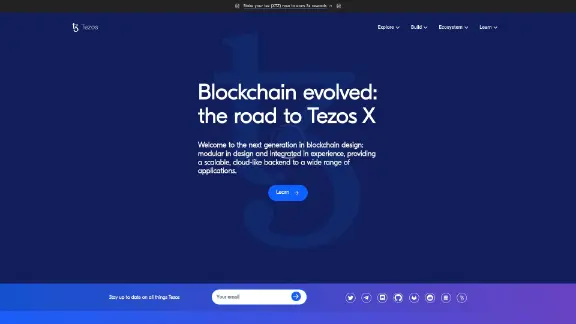Tezos (XTZ)
Tezos is an open-source blockchain network designed to support decentralized applications (Dapps) and smart contracts. It is community-governed and known for its self-amending capabilities, which enable the network to upgrade itself without requiring a hard fork. The mainnet of Tezos was launched in September 2018, and its native cryptocurrency is referred to as XTZ, tez, or ꜩ. A key feature of Tezos is its proof-of-stake consensus mechanism, called baking, which allows participants to earn rewards without the need for energy-intensive mining.
History

| Ticker | XTZ |
| Category | Smart Contract Platform |
| Website | https://www.tezos.com/ |
| @tezos | |
| https://www.reddit.com/r/tezos |
Arthur and Kathleen Breitman conceptualized Tezos in 2014, founding Dynamic Ledger Solutions Inc. to develop the project. Despite initial fundraising challenges, they launched an initial coin offering (ICO) in July 2017, raising $232 million in Bitcoin and Ether. This funding facilitated the acquisition of Dynamic Ledger Solutions Inc. and provided incentives for the Breitmans. The development of Tezos faced delays due to internal disputes but eventually went live in September 2018. The Tezos Foundation addressed legal challenges by reaching a settlement agreement in 2020.
Baking
Baking is the process of adding new blocks to the Tezos blockchain, ensuring transaction accuracy and preventing double-spending. To become a baker, participants need at least 8,000 XTZ, known as one roll. Those with fewer coins can delegate their XTZ to a baker, increasing their chances of earning rewards. This decentralized approach maintains network security and stability.
Governance
Tezos employs an on-chain governance mechanism that allows stakeholders to propose, vote, and activate protocol upgrades without a hard fork. The process involves several voting periods, with bakers casting votes proportional to their stakes. This self-amendment process ensures that Tezos can evolve over time through structured, decentralized decision-making.
Utility
Tezos serves as a platform for smart contracts and decentralized applications, offering a secure and efficient way to exchange value. Its self-upgradable blockchain supports innovation and incentivizes developers. The network's robust structure and emphasis on security make it suitable for various use cases, particularly in smart contracts.
Enterprise and government
Tezos is utilized in enterprise and government projects, including payment solutions and digital document verification. Notably, the French Gendarmerie's cybercrime division has used Tezos for recording judicial expenses, marking a significant government application of the protocol.
Corporate baking
Corporate baking involves enterprises participating in Tezos' baking process. Companies like EDF/Exaion, Ubisoft, and CoinHouse have become corporate bakers, offering services such as delegation, staking, and escrow solutions.
Central bank digital currency (CBDC)
Tezos is used for experimenting with Central Bank Digital Currency (CBDC), a digital form of currency regulated by central banks. Financial institutions like Société Générale have explored CBDC technology using Tezos.
Decentralized finance
Tezos supports various decentralized finance (DeFi) use cases, including decentralized exchanges and token standards. Projects like Quipuswap and Atomex demonstrate the network's DeFi capabilities.
Non-fungible tokens (NFTs)
Tezos facilitates the creation of non-fungible tokens (NFTs) for unique digital assets, such as art and collectibles. The platform offers standards and resources for NFT contract implementation and marketplaces.
Tokenization
Tezos enables the tokenization of assets, converting them into digital forms. This process is utilized by organizations like Logical Pictures and BNP Paribas for projects that benefit from reduced transaction costs and enhanced automation.
Decentralized identity
Tezos supports decentralized identity solutions, offering tools like Credible for managing and verifying credentials. This capability is particularly suited for identity use cases with a focus on security and risk management.
Decentralized autonomous organization (DAO)
Tezos supports the creation of decentralized autonomous organizations (DAOs) through frameworks like BaseDAO. DAOs facilitate transparent decision-making and automated execution, enabling tasks such as fund transfers and protocol updates.
